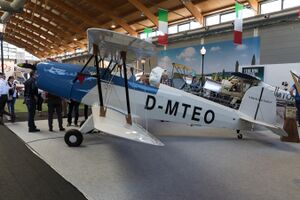Engineering:B&F Fk131 Bücker Jungmann
| Fk131 Bücker Jungmann | |
|---|---|

| |
| Role | Ultralight aircraft |
| National origin | Germany |
| Manufacturer | Podesva Air |
| Design group | B&F Technik Vertrieb GmbH |
| Designer | Peter Funk |
| Introduction | 2013 |
| Status | Production completed (2017) |
| Produced | 2013 |
| Number built | 10 |
| Developed from | Bücker Bü 131 Jungmann |
The B&F Fk131 Bücker Jungmann ()[note 1][1] is a German ultralight and homebuilt aircraft with the project design headed by B&F Technik Vertrieb GmbH of Speyer and the aircraft produced by Podesva Air of the Czech Republic, introduced at the AERO Friedrichshafen show in 2013. The aircraft was built in a production run of ten aircraft and supplied complete and ready-to-fly. By 2017 it was no longer advertised for sale.[2][3]
The aircraft is a replica of the 1934 Bücker Bü 131 Jungmann.[2]
Design and development
The project to produce a batch of Bücker Bü 131 Jungmann replicas was headed by B&F's Peter Funk. Production commenced in 2013 with an initial batch of ten aircraft. The aircraft were to be eligible for the Fédération Aéronautique Internationale microlight rules at a gross weight of 472.5 kg (1,042 lb) and experimental aircraft rules at a gross weight of 520 kg (1,146 lb).[2]
The design features a wire and strut-braced biplane layout, a two-seats in tandem open cockpit, fixed conventional landing gear and a single engine in tractor configuration.[2]
The aircraft duplicates the original 1934 Bü 131's construction. Its 7.25 m (23.8 ft) span wing is supported by cabane struts and a single set of parallel interplane struts outboard on the wings, with wire bracing. The standard engine used is the 82 hp (61 kW) Walter Micron IIIC four-stroke, inverted four cylinder, air-cooled powerplant.[2]
Specifications (Fk131)
Data from Tacke[2]
General characteristics
- Crew: one
- Capacity: one passenger
- Wingspan: 7.25 m (23 ft 9 in)
- Empty weight: 297 kg (655 lb)
- Gross weight: 472.5 kg (1,042 lb)
- Fuel capacity: 70 litres (15 imp gal; 18 US gal)
- Powerplant: 1 × Walter Micron IIIC four cylinder, inverted, air-cooled, four stroke aircraft engine, 61 kW (82 hp)
- Propellers: 2-bladed fixed pitch
Performance
- Cruise speed: 150 km/h (93 mph, 81 kn)
- Rate of climb: 2.9 m/s (570 ft/min)
Notes
- ↑ Commonly translated as young man, but often used to refer to a freshman, or a member of an organization in their first year, per Sarjeant, 1971, p.253.
References
- ↑ "German-English translation for "Jungmann"". en.langenscheidt.com. Stuttgart: PONS. 1 January 2020. https://en.langenscheidt.com/german-english/jungmann. "Jungmann m (Jungmann(e)s, Jungmänner): youngster, young man, recruit in his first year of service"
- ↑ 2.0 2.1 2.2 2.3 2.4 2.5 Tacke, Willi; Marino Boric; et al: World Directory of Light Aviation 2015-16, page 51. Flying Pages Europe SARL, 2015. ISSN 1368-485X
- ↑ FK-Lightplanes (2017). "FK-Lightplanes". http://www.fk-lightplanes.com/. Retrieved 19 February 2017.
 |

